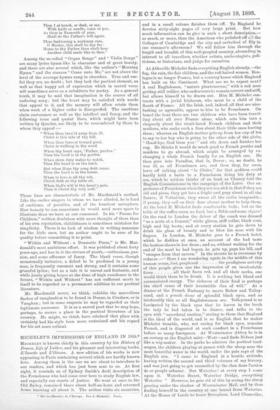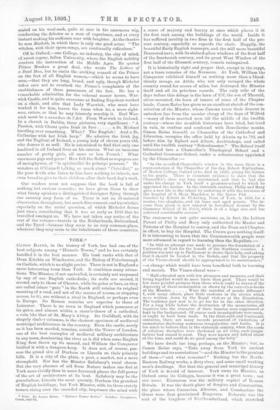MICHELET'S IMPRESSIONS OF ENGLAND IN 1834.*
MIOHELET is known chiefly in this country by his History of France, Life of Luther, and his pleasant and interesting books, L'Inseete and L'Oiseau. A new edition of his works is now appearing in Paris containing several which are hardly known here. Among them is the one we are about to introduce to our readers, and which has just been sent to us. At first sight, it reminds us of Sydney Smith's droll description of the Frenchman who had come over here to study English law, and especially our courts of justice. He went at once to the Old Bailey, remained there about half-an-hour, and returned home knowing all about it. The author visits six countries,
* Sur les Chemins de l'Hurope. Par J, Michelet. Paris,
and in a small volume finishes them off. To England he devotes sixty-eight pages of very large print. But how much information can he give in such a short description,— as much, or more, than the American who polished off all the Colleges of Cambridge and the city and cathedral of Ely in one summer's afternoon ? We will follow him through the length and breadth of this well-peopled country, abounding in interest to all travellers, whether artists, archaeologists, poli- ticians, or historians, and judge for ourselves.
At Abbeville Michelet finds everything English already,—the fog, the rain, the fair children, and the red-haired women. Bou- logne is no longer France, but a country house which England has built on the Continent. What are we to expect next? A real Englishman, "nature planteureuse," with a red nose getting still redder, who endeavours to remain correct and stiff, but allows himself to be drawn out. Him M. Michelet con- trasts with a jovial Irishman, who must be a child of the South of France. All the Irish, and, indeed, all that are nice- looking or agreeable, appear to him to be Frenchmen. On board the boat there are two children who have been travel- ling about all over France alone, which sets him into a rhapsody about the strait-laced French children and their mothers, who make such a fuss about their little ones leaving them; whereas an English mother gets up from her cup of tea to say to her boy who is going to the other side of the globe, " Good-bye, God bless you " and sits down and finishes her cup. He thinks it would do much good to French youths and maidens to go abroad, which might be arranged by ex- changing a whole French family for an English one. He then goes into Paradise, that is, Dover ; so, no doubt, he was ill, as all Frenchmen are, and then they, for once, leave off talking about la Gloire," for that goddess could hardly hold a basin to a Frenchman doing his duty at sea, which he seldom thinks of on land, as Chancy told the English Commissioner in the campaign of the Loire. Our ex- perience of Frenchmen when they are sea-sick is, that if they are old and pious, they get into a fright and pray aloud to all the Saints; if Voltairian, they swear all the oaths imaginable ; if young, they call on their dear absent mother to help them. At the hotel M. Michelet finds comfortable beds ; but on the table of the coffee-room no food, but a Bible and some cigars ! On the road to London the driver of the coach was dressed "as a mute at a funeral," white gloves, stiff collar, black coat, high and big boots; and at every station he gets down to drink his glass of brandy and to blow his nose with his fingers. In London, M. Michelet goes to a French hotel, which he dislikes at once, on account of the bad taste the hostess shows in her dress ; and so, without waiting for the end of the meal he had begun, he gets up, pays his bill, and escapes from that cavern." In the streets he is overcome by redness :—" Here I am wandering again in the middle of this human ocean, lost, perplexed the prodigious activity of this people gives one the impression of an incalculable
force all their faces red, and all their necks, one would think them to be drunk. It is nothing but blood and accumulated energy. The richness of their food is perhaps the chief cause of their irresistible 6/an of will." At a dinner at the French Embassy he meets Bulow and Talley- rand, and a Grande dame of splendid blank eyes, and as intolerably thin as all Englishwomen are. Talleyrand is so fascinated by the black eyes that he leaves in the lurch the lady he had taken in to dinner, and talks to the eyes with " sacerdotal unction," stating to them that England is the ideal of the world, and is so English that he makes Michelet tremble, who, not caring for black eyes, remains French, and is disgusted at such conduct in a Frenchman before so many foreigners. At Westminster Abbey he is in an ecstasy at the English saint—Watt—and finds Nelson just like a wig-maker. In the parks he admires the poetical land- scapes, the children playing at games with the sheep near the most beautiful water in the world, under the pale rays of the English sun. " I came to England in a hostile attitude, having written the second and third volumes of my history, and was just going to get reconciled by the élan dans notion de ce peuplo acharne. But Waterloo ! at every step I come upon it. Waterloo Street, Waterloo Bridge, everything Waterloo " However, he gets rid of this by seeing the sheep grazing under the shadow of Westminster Hall, and by thus finding himself in the country at one bound from Waterloo. At the House of Lords he hears Brougham, Lord Chancellor,
seated on his wool-sack, quite at ease in his enormous wig, conduoting the debates as a man of experience, and at every instant making his audience roar with laughter. At the theatre he sees Macbeth, in which there is only one good actor. " The witches, with their opera-songs, are continually ridiculous."
Off to Oxford,—one College, no industry, the city of mind, of sweet repose, fallen University, where the English nobility receives the instruction of the Middle Ages. He quotes Prince Muskau a great deal, who wrote The Letters of a Dead Man, but he omits the striking remark of the Prince on the feet of all English women,—which he seems to have seen,—that they are long, broad, and ugly, though Miehelet takes care not to overlook the Prince's complaints of the snobbishness ofthese possessors of the feet. He has a remarkable admiration for the colossal manor house, War- wick Castle, and is quite overcome at finding Napoleon worked o n a chair, and also that Lady Warwick, who must have worked it for him, leaves the room when he, a mere sight- seer, enters, so that he may leisurely worship it. Earl War- wick must be a sacerdoce de Art. From Warwick to Ireland. In a church in Dublin, three pictures, very significant: "A Passion, with Christ quite Irish in face a St. Michael kneeling over something. What ? The English ! And a St. Catherine with her Irish harp." He admires the Irish jig, and the Taglioni of Ireland, a young lady of eleven years old, who dances it so well. He is astonished to find that only one landlord in all Ireland lives on his estates. What an immense number of pretty girls, all more or less French ! What enormous pigs and geese ! How full the Belfast newspapers are of metaphysics, of "la spiritualite du principe pensant." He wonders at O'Connell talking so much about " l'hereclite," as the poor devils who listen to him have nothing to inherit, not even bread to give to their children after their hard day's work.
Our readers must not suppose that the book is full of nothing but curious remarks ; we have given these to show what funny opinions a distinguished foreigner flying through our country may form of us. There is not an ill-natured observation throughout, but much discernment and knowledge, especially on the social question, of which Miehelet forms just views, considering that it was as early as 1834 that be travelled amongst us. We have not taken any notice of the -rest of the volume—travels in the Netherlands, Switzerland, and the Tyrol—because they seem to us very common-place, whatever they may seem to the inhabitants of those countries.



































 Previous page
Previous page